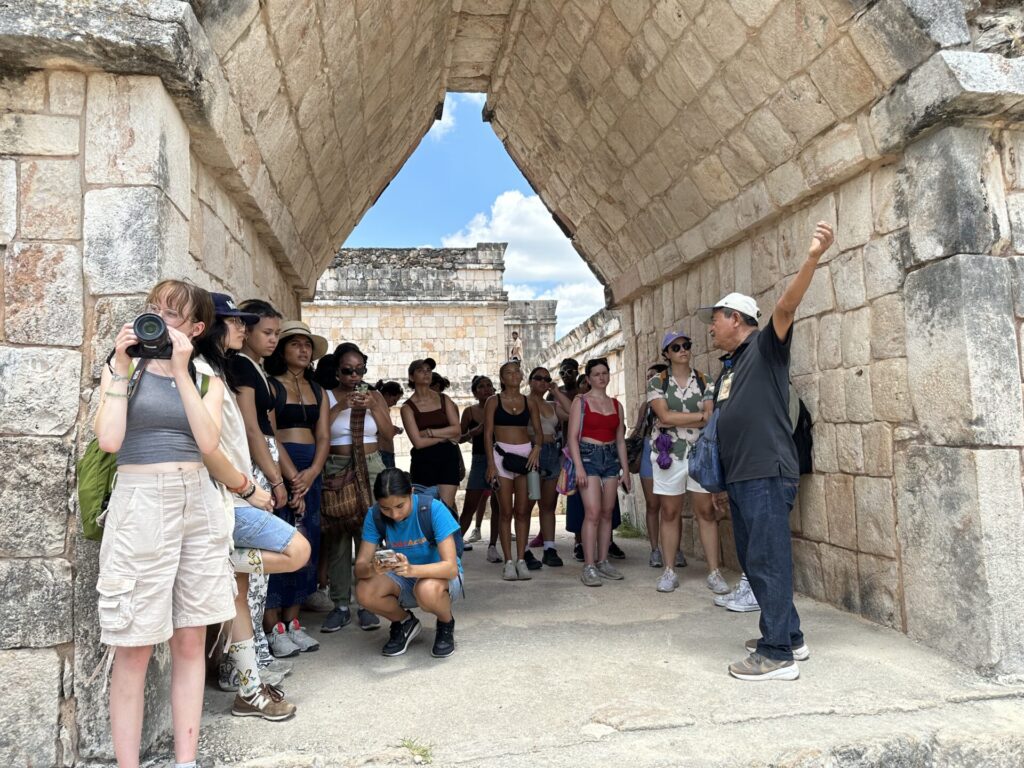
Your experience in the Yucatán has been guided by many narrators: tour guides of varying reliability, local students, your professors and guest lecturers (scholars, journalists, artists, performers), the people you’ve met, and, of course, our authors—Indigenous, colonial, and neocolonial. Your final post will summarize these engagements with the Yucatán over the last month, referencing the texts we’ve read and the critical lenses we’ve tried on.
There’s no required word count. Write as much as you need. The only requirements are that you 1) write honestly about your experience, and 2) reflect on those experiences with reference to three or more things we’ve read (travel writing over the centuries; legend; oral literature; works of scholarship and theory) or watched (films). Click “Readings” and “Films” to refresh your memory!
Below are some approaches you might try. None of these prompts are completely disconnected from the others. So, if you wish to try out more than one approach in your reflections, please do.
• One (Or Several) Excursions. Focus on one (or several) of the excursions we’ve gone on together. Which of those excursions corresponded to your expectations of the Yucatán, which surprised you, and which disappointed? Where did your expectations derive from? Why, in each instance, did you have the reaction you had? How do the stories we’ve read and the histories we’ve studied impact your understanding of these experiences?
• The “T” Word. Even though you came here as university students asking serious questions about colonialism and history, from the outside you are indistinguishable from the flood of tourists who descend on the Yucatán every year. Is travel a right, a responsibility, or a luxury? Some combination of the three? In other words, reflect on the ethics of your experience. What have you learned about being an American or European (perceived or actual) abroad? How have your attitudes about America’s or Europe’s relationship to the rest of this hemisphere changed?
• Colonialism and Tourism. Our discussion of Cannibal Tours was pivotal in shaping how we interrogated our experiences here, and the experiences we have observed others having. We all agreed, as filmmaker Dennis O’Rourke makes clear in his film, that there is some continuity between the colonial experience and the touristic experience. Where have you seen this overlap between colonialism and tourism in your experiences? Can you read the touristic experience as harkening back to colonialism, and the colonial experience as pointing towards new, postcolonial modes of consumption and exploitation?
• The World in an Artifact. As we have learned, archaeologists must reconstruct distant times from objects and structures that do not easily give up their secrets to the naked eye. Use photographs of three objects that you have seen, bought, or even made yourself during this experience. An object can be any artifact of this trip: a photograph you took, a souvenir you’re taking away, a drawing you made, a poem you wrote, or something you encountered in a museum. How do your artifacts tell a story about your time in the Yucatán? How do the histories and theories we have discussed help explicate the artifacts you chose? (You might think about the distinctions between handicraft, souvenir, and ethno-commodity that Francisco Javier Fernández Repetto drew in our final lecture, and the values—pertaining, for example, to tradition, modernity, and gender–that cultural products can convey.) What story are you taking away from the Yucatán–and what meanings are you producing–in your selection of artifacts? What smart, super-academic things would you say to somebody back home about the three objects?
